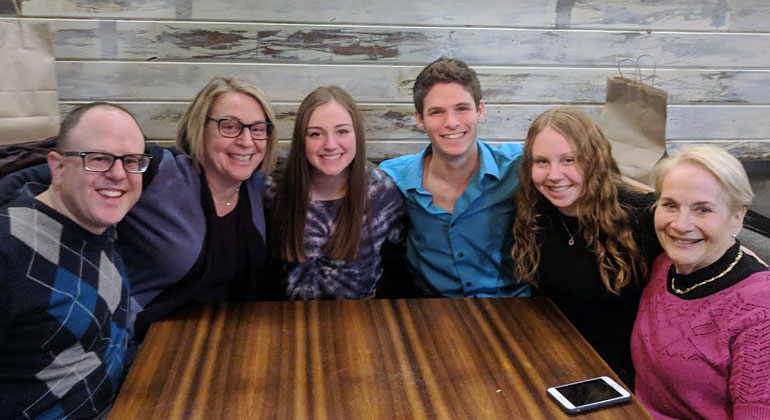My Family’s Breast Cancer Journey

The CDC reports that 1 in 40 Ashkenazi Jewish women has a BRCA gene mutation, which is the most widely known genetic factor that can lead to breast cancer.
This is my family’s breast cancer journey.
In 2003, eleven years after we lost my father to Mesothelioma, an asbestos related lung cancer, my mother was diagnosed with breast cancer. My mind could not understand how this could happen to my family, again. My already broken heart was breaking even more.
My husband Brian and I were finally sleeping through the night and we were busy with our 4 and 1-year old daughters. My mother had a radical lumpectomy and her treatment plan was chemotherapy and radiation. My sister teaches full-time and she couldn’t care for my mom during treatment and I couldn’t go to Florida to be with her. Brian and I decided that my mom would come to Chicago for her treatment — this way I could help her and Brian would be able to pitch in more with the girls.
When treatment was over, my mom decided to get tested for the BRCA genes. At that time, it was not covered by insurance, but she felt it was important for my sister and I to know if she carried the gene. Thankfully, she was negative.
In the ensuing years, my mother’s identical twin sister, a first cousin and a niece were all diagnosed with breast cancer. We also believe that a maternal aunt died of the same disease, when my mom was a young woman. The family history page in my medical file was getting longer and my Ashkenazi roots bearing their ugly head.
At the age of 33, I started having a yearly mammogram, because of my mother’s diagnosis. In the last 15 years, I have had two biopsies and a fibroid adenoma removed.
When we met with the breast surgeon before the fibroid adenoma surgery, she highly recommended that I have a consultation with a genetics specialist and that I would be eligible for a yearly breast MRI. Brian and I talked about it and we realized that it was important to find out if I was a carrier, for my daughters, Brooke (19) and Shaina (16).
We met with the genetic counselor and she mapped out my family history. The conclusion was that my mom was the connector to all the family members who had been diagnosed. She needed to be re-tested for BRCA and a host of other gene mutations that were now linked to breast cancer. The question was not even out of my mouth and my mother was rolling up her sleeve for the blood test. Again, she was negative, but it wasn’t a guarantee that I didn’t have a mutation.
Since my Dad passed away at the age of 47, we didn’t know much about his family medical history. The genetic counselor suggested my sister and I both be tested for the three most common BRCA genes (BRCA1, BRCA2, and PALB2) to be sure we weren’t carriers.
After spitting a ridiculous amount of saliva into a tube and sending it off via FedEx, I am thankful to not be a carrier of the breast cancer gene mutations, either.
We live in an amazing time, where advanced medical testing will give our girls some peace of mind, that they will not get a hereditary form of breast cancer. But they know that they still need to be diligent with getting tested, when it is appropriate. This year, my mom will be 15 years, cancer-free. A true blessing.
JCC Chicago, and the agencies we partner with, employ many, many Jews of Ashkenazi descent. Our colleagues, family and friends have been touched and lost to this insidious disease. I am lucky to work in an environment that allows us to share these stories and important information on how to get tested.
I am thrilled that the JCC Chicago Jewish Film Festival will be showing Grace: A short film about breast cancer, tattoos, and the battle that begins when everyone else thinks the war is already won, in partnership with the Northbrook Public Library on October 22 at 7pm.
Learn more at: Sarnoff Center for Jewish Genetics






